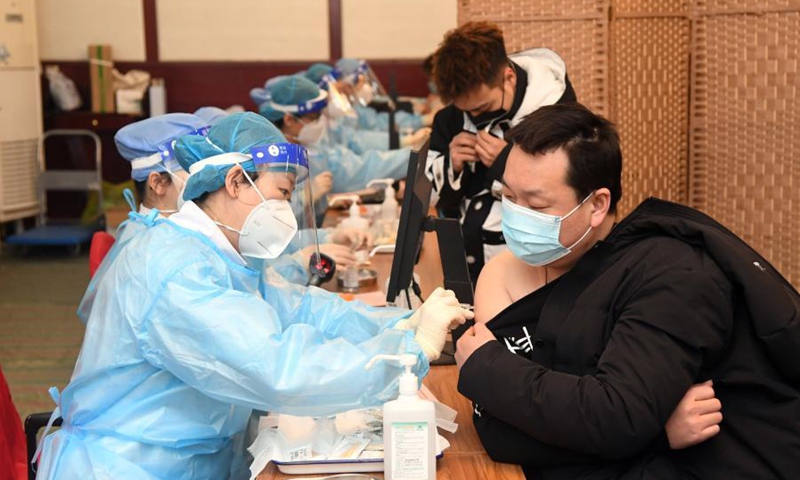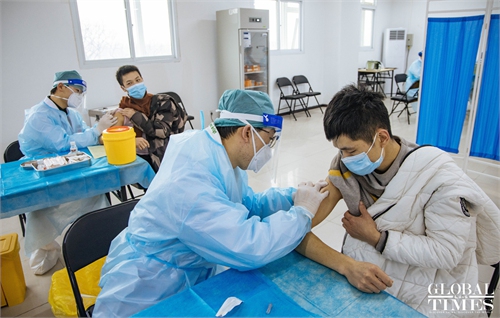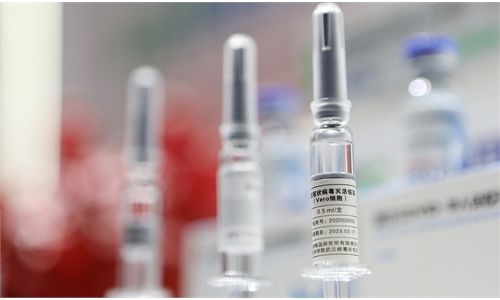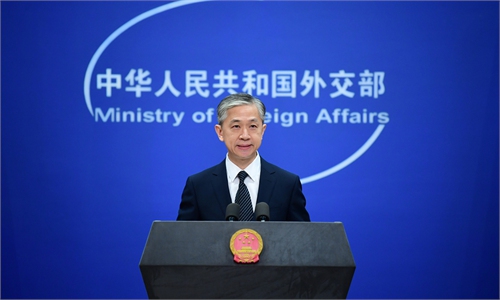
A medical worker inoculates a recipient with the second dose of COVID-19 vaccine at a temporary vaccination site in Haidian District of Beijing, capital of China, Jan. 31, 2021. The administration of the second dose of COVID-19 vaccines for key groups of residents throughout Beijing started on Jan. 22, and is expected to conclude before Feb. 8. (Xinhua/Ren Chao)
More than 80 people were arrested and 3,000 doses of fake COVID-19 vaccines were confiscated in a special campaign that China has carried out to crack down on vaccine-related crimes. The suspects had been profiting from the illegal manufacturing and sales of the vaccines since September 2020.
The case was solved in a joint action by police in Beijing and East China's Jiangsu and Shandong provinces and other regions, according to reports from the Xinhua News Agency on Monday. The criminal activity was scattered across multiple cities.
All fake vaccines have been tracked, said the reports. However, it was not revealed where the vaccines had been heading.
The captured suspects might have planned to send the vaccines abroad, a source close to a major Chinese vaccine producer told the Global Times.
The source also said a group of people had smuggled vaccines into Africa before, although it is not known how they managed to leave the country.
According to the reports, the suspects made fake COVID-19 vaccines by injecting saline into pre-filled syringes and sold them at high prices.
"The 'vaccines' filled with saline will for sure have no effect, but neither will it cause health problems, so it is clear that the suspects wanted money, not hurt people," Tao Lina, a Shanghai-based vaccine expert, told the Global Times on Monday.
China's Ministry of Public Security launched a special campaign to crack down on illegal production and sale of counterfeit vaccines, smuggling, illegal vaccination and other vaccine-related crimes.
The source said public security departments had checked with the vaccine manufacturers several times to confirm that the vaccines illegally sold in markets were fake ones produced by suspects, and had not come from manufacturers.
Though the identity of the "customers" of the fake vaccines remains unknown, Tao said it could not have been vaccination institutions officially registered by the centers for disease control and prevention, as "they all know the risk of receiving fake vaccines is too great."
In China, each box of vaccines has a unique code that must be scanned during the vaccination process to confirm its authenticity, although it is also possible that the code might not be scanned during the process of emergency vaccination, Tao noted.
The world is eager for coronavirus vaccines. In early January, Japanese media claimed some Japanese elites are being inoculated with Chinese vaccines, which were suspected of being smuggled to Japan. But the reports were slammed by Chinese Embassy to Japan as unverified and misleading.




